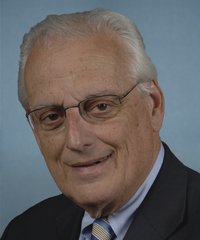
Congressman Bill Pascrell, Jr. has built a life of public service around the principles he learned while growing up on the south side of Paterson, New Jersey. The first member of his family to graduate high school, Congressman Pascrell went on to receive dual degrees from Fordham University, serve in the United States Army, and become a teacher and adjunct professor. He served as a State Assemblyman and Mayor of Paterson before his election to the United States Congress in 1996. In the Congress, Congressman Pascrell has prioritized funding public safety, supporting educators, protecting our environment, and making our tax system fairer. He now serves as Chairman of the Ways and Means Oversight Subcommittee, where he works tirelessly to improve our tax system for working families.
Bill has made homeland security a cornerstone of his work on behalf of the American people in Congress. He was named as an original member of the House Homeland Security Committee when it was created as a Select Committee in the wake of 9/11. Bill knows that our government has no greater responsibility than to protect and defend our communities from those who would seek to do us harm.
As a recognized leader in the House on homeland security, Bill was selected by his colleagues in the 109th Congress to serve as the Ranking Democratic Member of the Subcommittee on Emergency Preparedness, Science, and Technology within the Homeland Security Committee. Chief among his responsibilities, Bill oversaw the government's funding to first responders-and worked to funnel much-needed dollars to support those who serve on the front lines: firefighters, police officers, and healthcare workers. In this role Bill also championed the issue of interoperability, for which on 9/11 many brave first responders were not able to communicate with each other because of interoperable radio equipment. Bill co-authored the bipartisan “21st Century Emergency Communications Act of 2006,” which for the first time elevated the Department of Homeland Security’s interoperability focus by establishing a new Office of Emergency Communications.
In the 110th Congress Bill was a strong supporter of the first bill passed by the new Democratic-led Congress, H.R. 1, which finally implemented the recommendations of the 9/11 Commission. This landmark legislation addressed a wide range of critical homeland security sectors including port security, aviation security, mass transit security, funding for first responders and developing strategies to reduce the appeal of extremism. Within this legislation Bill fought to ensure a new risk-based funding formula so that New Jersey would finally get its fair share of homeland security grants.
In the 111th Congress Bill took note of the fact that as we close in on a decade since the attacks of 9/11 we still do not have a comprehensive national strategy to counter the grave threat that weapons of mass destruction pose to our nation. In response Bill introduced H.R. 5498, “The WMD Prevention and Preparedness Act of 2010.” This bipartisan legislation makes progress toward implementing the recommendations of the WMD Commission and will improve U.S. efforts to prevent, deter, detect, and respond to an attack by a weapon of mass destruction. The WMD Commission offered its full endorsement of the legislation and it subsequently passed unanimously out of the Homeland Security Committee.
Bill's tenure in Congress has also been punctuated by his persistent, vocal leadership on issues facing our nation's first responders. His landmark "Firefighter Investment and Response Enhancement Act," or "FIRE Act," introduced in March of 1999 and signed in to law in 2000 by President Clinton, was the first comprehensive national legislation dedicated to meet the needs of America's 32,000 volunteer, paid, and part-paid fire departments.
Bill knows there is a staggering amount of work to do in order to protect our nation. We need to secure our borders to terrorists, protect our railways and passenger trains, secure our stockpiles of nuclear, chemical and biological material and make substantial investments in intelligence technology, to name but a few. Bill intends to work aggressively on the floor of the House and in the Homeland Security Committee to see these goals accomplished and keep our country safe.